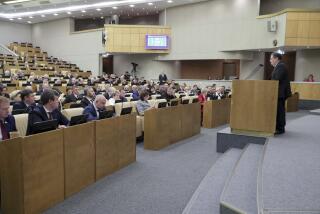Protests Spur Lawmakers to Shell Out for Russia Miners
- Share via
MOSCOW — Angry coal miners blocked trains on the Trans-Siberian Railway and barricaded the offices of two high-ranking officials Friday, prompting lawmakers to vote for an emergency bill that would cut their own office budgets and send the money to Russia’s troubled mining regions.
The sudden show of generosity by the Duma, Russia’s lower house of parliament, followed days of protests by miners across the country over wages that have not been paid for up to a year--an estimated $600 million total.
“The situation in the mining industry is truly critical today,” Prime Minister Sergei V. Kiriyenko told the Duma as he proposed the unusual $83-million transfer. “It will undoubtedly mean that all of us will have to slash some of our own expenditures--we will have to go on business trips abroad less often.”
Russia’s miners were among the first to support President Boris N. Yeltsin during the breakup of the Soviet Union early this decade. But they are among those hit the hardest under Yeltsin’s economic programs, which have enriched a handful of industrialists while plunging millions of working people into poverty.
Over the past week, labor protests have spread to at least five mining regions. In the southern Siberian city of Anzhero Sudzhensk, 1,000 miners stood on the railroad tracks Friday and blocked at least 30 trains--most of them filled with coal--on the all-important Trans-Siberian Railway that links Moscow with Russia’s Pacific coast.
Above the Arctic Circle, miners in Vorkuta kept the mayor and the director of the regional coal company trapped in their offices for the third day, vowing not to release them until the workers receive their back pay, the Itar-Tass news agency reported. In Inta, to the south, strikes have shut down coal mines for more than a week; more than 150 miners are also on a hunger strike.
The protests prompted the Duma to demand action from the newly appointed prime minister. With Yeltsin in Britain for a summit of industrialized nations, Kiriyenko responded by making an unscheduled appearance in the Duma and proposing the emergency bill to cut the office budgets of the parliament, Cabinet and presidential administration by 25%.
In a rare show of solidarity, the Communist-dominated Duma embraced Kiriyenko’s proposal and suspended its own rules so it could take up the measure immediately. The lawmakers approved the bill by a vote of 371 to 2 on first reading, with final passage scheduled for early next week.
Despite the willingness of the prime minister and parliament to cut their own budgets, labor leaders said the $83 million would hardly be enough to improve the miners’ situation.
“It will not change anything radically for the better,” Ivan I. Mokhnachuk, deputy chairman of the Russian Miners Trade Union, said in an interview on NTV television. “The people are already tired of waiting. . . . Do they [the president’s advisors] pin their hopes on the renowned limitless patience of the Russian people? Well, everything has its limits.”
More to Read
Sign up for Essential California
The most important California stories and recommendations in your inbox every morning.
You may occasionally receive promotional content from the Los Angeles Times.













